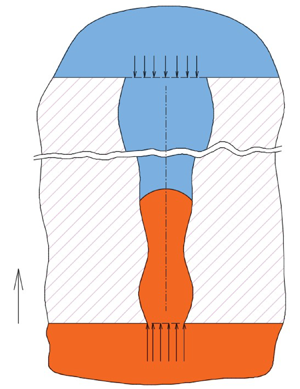Published online by Cambridge University Press: 17 August 2022

In this work, we investigate the problem of imbibition/drainage of a fluid in capillaries of arbitrary axisymmetric cross-sections filled initially with another immiscible one. The model predicts the location of the meniscus and its speed along the tube length with time. The two immiscible fluids may assume any density and viscosity contrasts. In addition, the axisymmetric profile of the tube maintains a relatively small angle of tangency to warrant that the axial velocity distribution assumes, approximately, a parabolic profile. The driving forces that may be encountered in this system include the capillary force, pressure force, gravitational force and an opposing viscous force. The orientation of the capillary force can be in the direction of the flow (e.g. during imbibition) or opposite to the flow (e.g. during drainage). Likewise, the gravitational force can be in the direction of the flow or opposite to it. In this work we account for all these possibilities. A differential equation is developed that defines the location of the meniscus with time. A fourth-order-accurate Runge–Kutta scheme has been developed to provide solutions for the different scenarios associated with this system. It is shown that the developed model reduces to those appropriate for straight tubes, which builds confidence in the modelling approach. The effects of changing the tangent along the profile of the tube, which influences the calculation of the radius of curvature of the meniscus, is also considered. Unlike the cases of straight capillary tubes, in tubes with arbitrary symmetric profiles, the friction force depends on the variations of the tube profile. Examples of converging/diverging capillary tubes that follow straight and power law profiles are investigated. In addition, the case of sinusoidal profiles has also been considered.